Are overnight oats healthy? If you’ve ever scrolled through wellness blogs or Instagram, you’ve likely seen this creamy, no-cook breakfast in countless jars. But the real question is—are overnight oats good for you, or are they just another trendy food? The truth is, overnight oats can be a wholesome, balanced meal when made with the right ingredients.
In this article, we’ll answer once and for all: are overnight oats healthy? We’ll look at their nutrition facts, calories, and benefits, while also exploring whether eating them every day is a good idea. You’ll also get practical tips to make your overnight oats higher in protein, fiber, and healthy fats—so you can enjoy them without second-guessing their place in your diet.
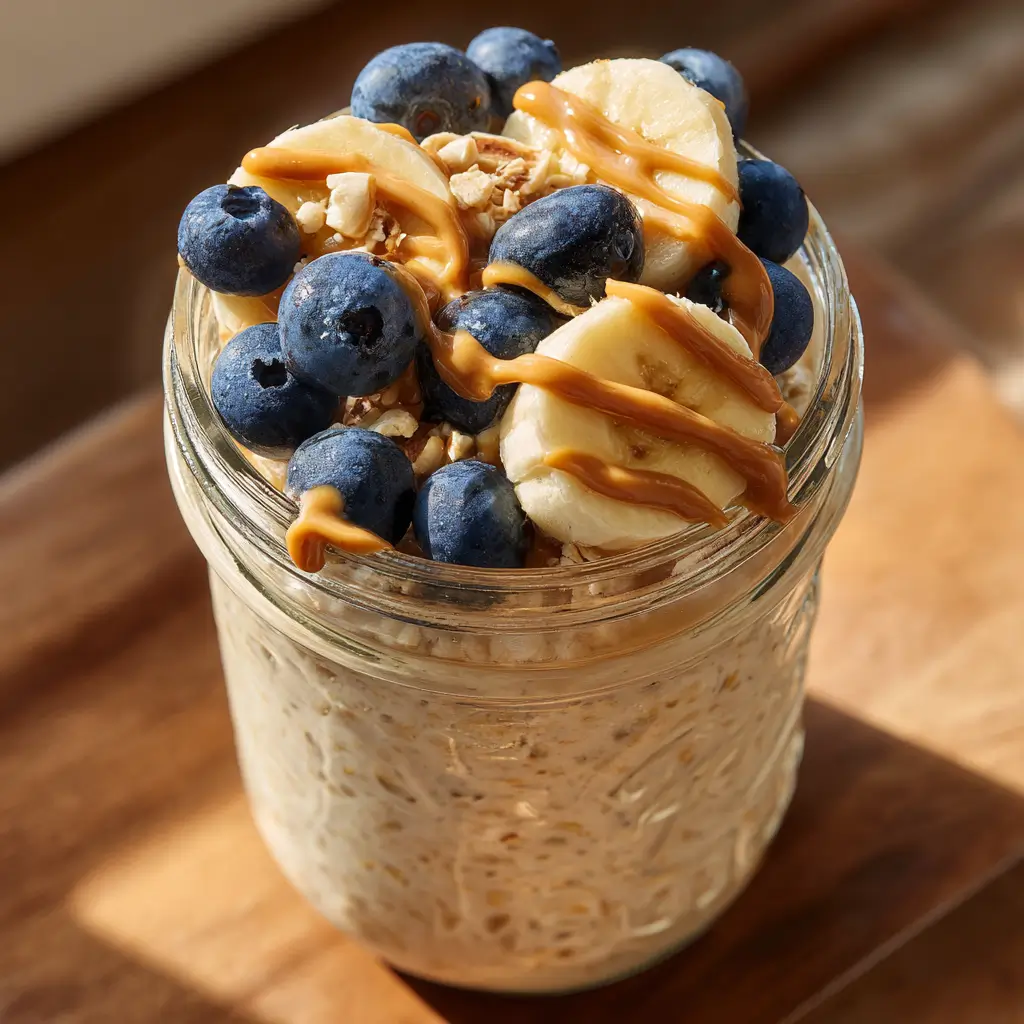
Don’t miss our high-protein vegan overnight oats, a perfect example of how overnight oats can be both delicious and packed with nutrients.
(Psst — don’t forget to join our community on Facebook and follow us on Pinterest for fresh recipe ideas daily!)
Table of Contents
What Are Overnight Oats?
The Basics of Overnight Oats
So, what exactly are overnight oats—and are overnight oats healthy right from the start? Overnight oats are simply rolled oats soaked in liquid overnight, usually milk, yogurt, or a plant-based alternative. This no-cook method softens the oats, giving them a creamy texture by morning. The beauty is in the convenience: you prepare them at night, and they’re ready to eat the next day.
Unlike cooked oatmeal, overnight oats don’t require heat, making them an easy option for busy mornings. They can be enjoyed cold straight from the fridge, or you can warm them up if you prefer a cozy bowl. When made thoughtfully, overnight oats can be both tasty and nourishing—another reason people ask, are overnight oats good for you?
Print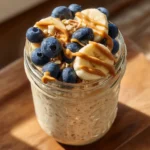
Are Overnight Oats Healthy? Nutrition Facts & Benefits Explained
- Total Time: 8 hours 5 minutes
- Yield: 1 serving 1x
- Diet: Vegetarian
Description
A simple and nutritious make-ahead breakfast featuring oats, chia seeds, and your favorite fruit.
Ingredients
- ½ cup rolled oats
- ¾ cup milk (dairy or plant-based)
- 1 tbsp chia seeds
- 1 tsp honey or maple syrup
- ½ cup fruit of choice
Instructions
- Combine oats, milk, chia seeds, and sweetener in a jar.
- Stir well, seal, and refrigerate overnight (at least 8 hours).
- In the morning, stir again, add fruit toppings, and enjoy cold or warm.
Notes
You can customize with different fruits, nuts, or spices like cinnamon for extra flavor.
- Prep Time: 5 minutes
- Cook Time: 8 hours
- Category: Breakfast
- Method: No Cook
- Cuisine: American
Nutrition
- Serving Size: 1 serving
- Calories: 250
- Sugar: 10g
- Sodium: 100mg
- Fat: 7g
- Saturated Fat: 1g
- Unsaturated Fat: 6g
- Trans Fat: 0g
- Carbohydrates: 38g
- Fiber: 8g
- Protein: 9g
- Cholesterol: 0mg
Ingredients Commonly Used in Overnight Oats
The answer to “are overnight oats healthy” often depends on what you add to them. The base recipe is simple—oats and liquid—but the fun is in the mix-ins. Common additions include:
- Seeds: Chia seeds, flax seeds, hemp seeds (rich in fiber and omega-3s).
- Proteins: Greek yogurt, nut butter, or protein powder for extra staying power.
- Fruits: Fresh berries, bananas, apples, or dried fruits for vitamins and natural sweetness.
- Spices & Flavor Boosts: Cinnamon, nutmeg, vanilla extract, or cocoa powder.
This versatility makes overnight oats customizable to fit nearly any diet—vegan, dairy-free, high-protein, or low-calorie. If you’re curious about creative ways to upgrade your breakfast, check out our chocolate peanut butter overnight oats for a decadent yet nourishing twist.
Are Overnight Oats Healthy?
Nutritional Profile of Overnight Oats
When people ask “are overnight oats healthy?” the best way to answer is by looking at their nutritional profile. Overnight oats are packed with complex carbohydrates that release energy slowly, helping you feel fuller longer. They also provide fiber, which supports digestion and heart health, along with important minerals like magnesium, zinc, and phosphorus.
But the real reason so many people wonder, “are overnight oats good for you?” is that the health value depends on how you make them. A jar of oats with sugary toppings may not be as healthy as one with Greek yogurt, chia seeds, and fresh fruit. When built with balance in mind, overnight oats can absolutely be a nutrient-rich breakfast.
If you want proof, check out our high-protein overnight oats for weight loss, which show how this simple breakfast can support your health goals.
Comparing Overnight Oats vs Traditional Cooked Oats
Another common question is: are overnight oats healthy compared to cooked oats? The truth is, they’re nutritionally very similar. Both options provide fiber, plant-based protein, and the cholesterol-lowering compound beta-glucan. The difference lies mostly in preparation and texture.
- Cooked oats are warm, softer, and often flavored while cooking.
- Overnight oats are creamier, eaten cold or warm, and often packed with flavorful add-ins that soak overnight.
Interestingly, soaking oats overnight can lower phytic acid, a compound that may limit absorption of certain minerals. This means overnight oats may even give you slightly more accessible nutrition than cooked oats.
So, when we circle back to the big question—are overnight oats healthy and are overnight oats good for you?—the answer is yes, especially when you customize them with protein, fiber, and nutrient-rich toppings.
Overnight Oats Nutrition Facts
Calories in Overnight Oats
One of the top questions people ask is not just “are overnight oats healthy,” but also “why are overnight oats so high in calories?” The truth is, the calorie count varies a lot depending on your recipe. A basic serving of overnight oats made with just oats and milk may have around 200–250 calories. But once you add nut butter, yogurt, seeds, and fruit, that number can climb to 350–400 calories or more.
Now, does that mean overnight oats aren’t good for you? Not at all. Calories aren’t the enemy—they’re fuel. If anything, a higher-calorie jar can be more balanced and satisfying, especially if it includes protein and healthy fats. This is why many dietitians agree that overnight oats are good for you as long as they’re part of your overall balanced diet.
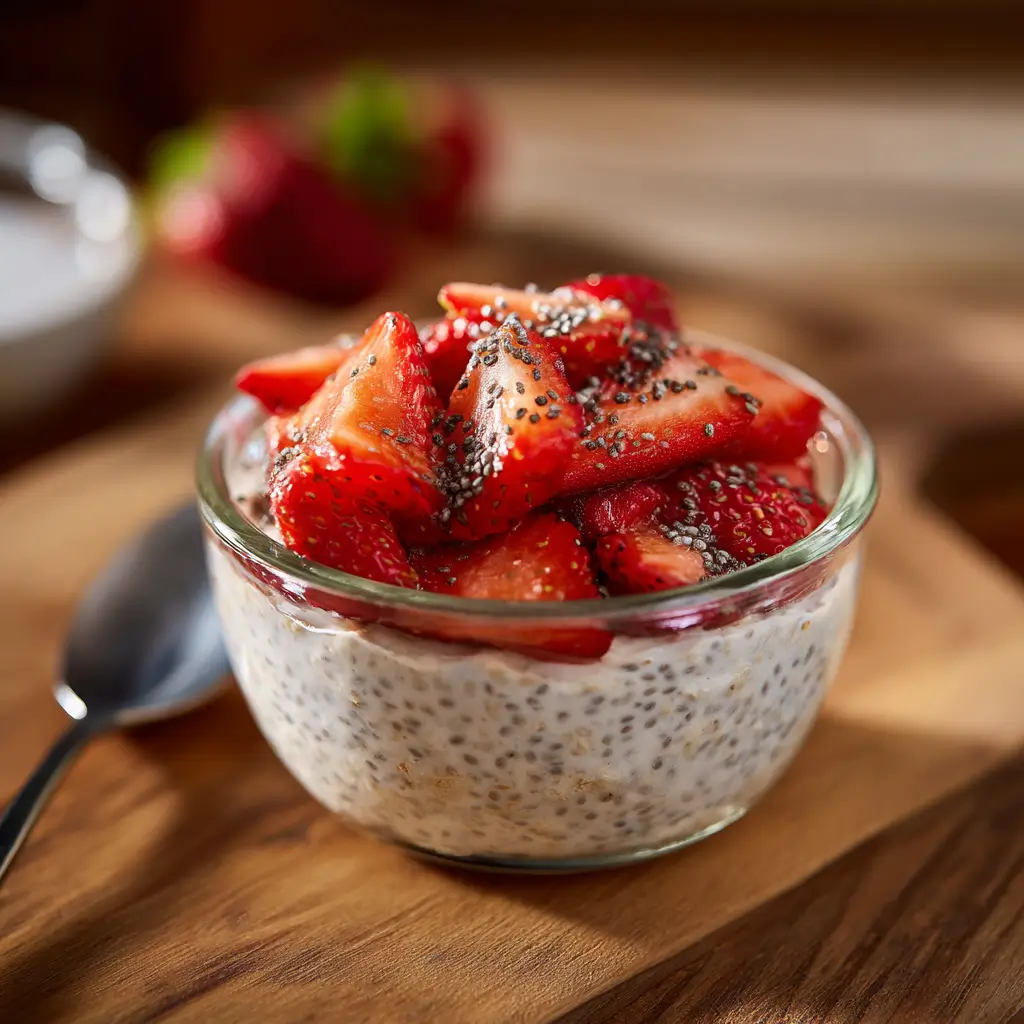
For example, our low-calorie overnight oats show how you can enjoy oats in a lighter way while still getting plenty of fiber and flavor.
Macronutrients: Protein, Carbs, Fat, and Fiber
So, what makes overnight oats healthy from a macronutrient perspective? Here’s a breakdown of what you’ll usually find in one serving (without heavy toppings):
| Nutrient | Approximate Amount (per 1 cup serving) | Why It Matters |
|---|---|---|
| Carbohydrates | 28–35 g | Provides long-lasting energy |
| Protein | 8–12 g (higher with yogurt or protein add-ins) | Supports muscle and satiety |
| Fat | 5–10 g (higher with nut butter/seeds) | Helps absorb vitamins, supports fullness |
| Fiber | 7–10 g | Aids digestion and gut health |
This macronutrient balance is exactly why so many people wonder “are overnight oats healthy for daily eating?” When prepared with a mix of carbs, protein, and fats, overnight oats can be a complete meal that keeps you satisfied for hours.
Benefits of Overnight Oats
Digestive Health and Gut Benefits
One of the biggest reasons people ask “are overnight oats healthy?” is because they’re loaded with fiber. Fiber is essential for good digestion, and overnight oats are a fantastic source. Just one serving can provide 7–10 grams of fiber, which helps keep your digestive system running smoothly and supports a healthy gut microbiome.
Oats are especially rich in beta-glucan, a soluble fiber shown to reduce cholesterol levels and improve gut bacteria balance. That’s why dietitians often say overnight oats are good for you if you want to support digestive wellness. Adding chia seeds or flaxseeds boosts the fiber content even more, making overnight oats one of the best breakfast options for gut health.
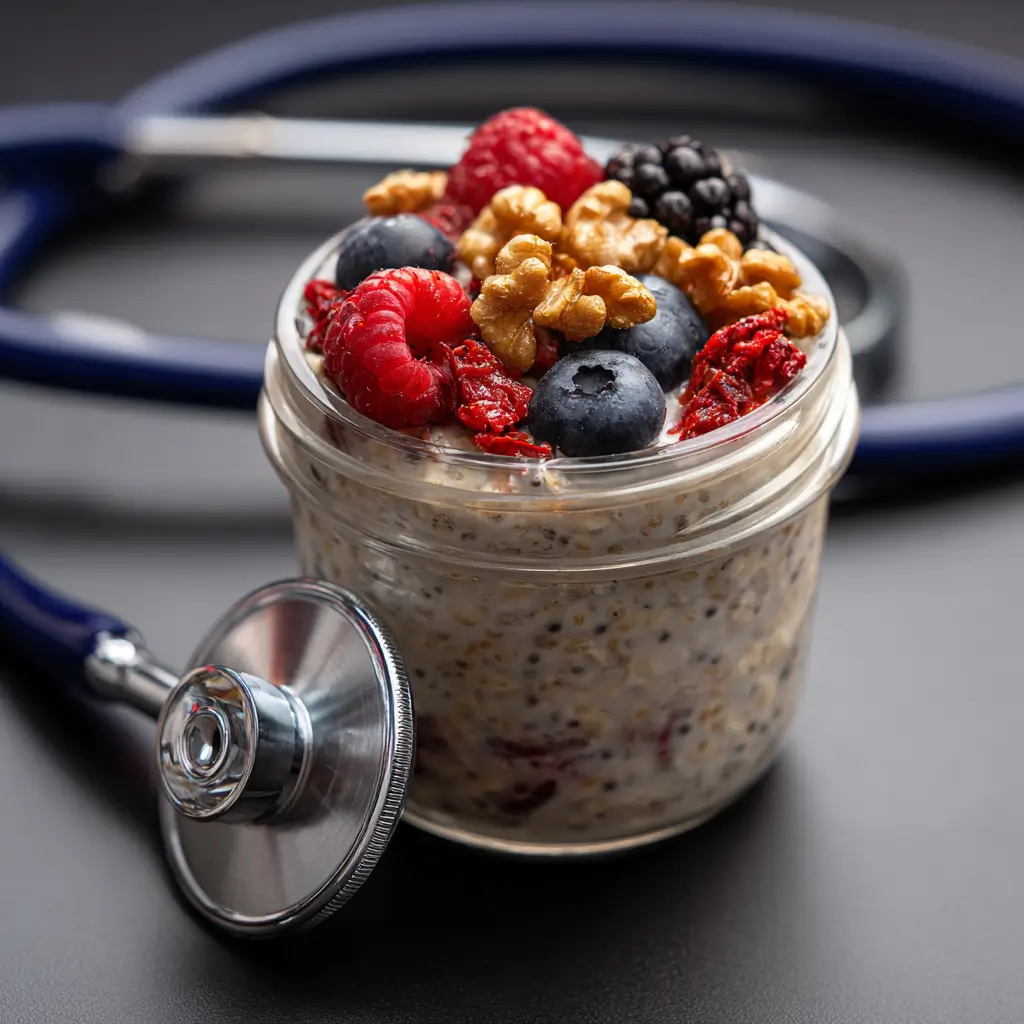
If you’re curious about the science of gut-friendly foods, don’t miss our prebiotics and probiotics for digestive health guide.
Heart Health and Cholesterol Management
Another clear benefit of overnight oats is their positive impact on heart health. The beta-glucan in oats helps reduce LDL cholesterol (“bad” cholesterol), lowering your overall risk of heart disease. Regularly eating oats—whether cooked or overnight—has been linked to better heart health outcomes.
So, when people ask “are overnight oats healthy for your heart?” the answer is yes. Overnight oats can be a delicious, natural way to support cardiovascular health when paired with other heart-smart foods like berries, nuts, and seeds.
Weight Management and Satiety
Finally, overnight oats can help with weight management. Thanks to their high fiber content and potential for added protein, overnight oats can keep you full for hours, which may reduce snacking and overeating later in the day.
Still, some worry about calories. Remember, the key question isn’t “why are overnight oats so high in calories?” but rather “are overnight oats good for you as part of a balanced diet?” When prepared thoughtfully, the calories in overnight oats are nutrient-dense and support energy balance, not empty calories from sugar or processed foods.
That’s why so many people looking to lose or maintain weight include overnight oats in their routine—they’re filling, nourishing, and adaptable to almost any dietary goal.
Downsides of Overnight Oats
Low Protein Content in Many Recipes
While it’s clear that overnight oats are healthy, not every recipe tells the full story. A common drawback is that many overnight oat recipes are too low in protein to be considered a complete meal. Most adults need 20–30 grams of protein at breakfast for steady energy and satiety, but many basic overnight oats recipes only provide 8–10 grams.
This gap can leave people wondering, “are overnight oats good for you if they don’t keep you full?” The answer depends on what you add to them. Pairing your oats with Greek yogurt, protein powder, nut butter, or seeds can boost the protein content and turn overnight oats into a balanced, satisfying meal.
Need ideas? Check out our protein overnight oats without protein powder for natural, high-protein options.
Phytic Acid Concerns: Are They Real?
Another downside people mention when asking “are overnight oats healthy?” is the presence of phytic acid, sometimes called an “anti-nutrient.” Phytic acid can bind to minerals like iron, zinc, and calcium, reducing how much your body absorbs from a single meal.
But here’s the good news: soaking oats overnight actually reduces phytic acid levels, making minerals more bioavailable. Plus, if you’re eating a balanced diet with plenty of nutrient-rich foods, phytic acid is rarely an issue.
So when we ask again, “are overnight oats good for you?” the answer is still yes—especially if you’re eating them as part of a varied diet. The benefits far outweigh this small drawback.
Are Overnight Oats Good for You Every Day?
What Happens if You Eat Overnight Oats Daily?
One of the most common questions is: “are overnight oats healthy to eat every single day?” The short answer is yes—overnight oats can be part of a daily routine, as long as you vary the ingredients and balance them with protein and healthy fats.
Eating overnight oats daily provides a steady source of fiber, slow-digesting carbs, and essential minerals. Many people find that starting the day with fiber-rich oats helps with digestion, keeps them full longer, and even supports better cholesterol levels.
But like anything else in nutrition, balance is key. If your overnight oats are always the same, you may miss out on other nutrients. That’s why it’s smart to rotate toppings and mix-ins like fresh fruit, nut butters, and seeds.
For example, our mason jar overnight oats show how easy it is to prep different flavors in advance so you don’t get bored with your breakfast.
Best Practices for Daily Consumption
So, are overnight oats good for you if you eat them every day? Absolutely—but here are a few tips to maximize the benefits:
- Add protein: Include Greek yogurt, whey protein, or nut butter to avoid hunger later.
- Switch up toppings: Use a mix of fruits, nuts, seeds, and spices to get a wide range of vitamins and minerals.
- Watch sweeteners: Instead of sugar, try honey, maple syrup, or natural fruits.
- Mind portion sizes: A 200-calorie jar may not be enough for most adults; aim for a balanced meal with at least 300–400 calories.
In short, the answer is yes—overnight oats are healthy for daily eating, as long as they’re prepared with balance in mind.
Customizing Overnight Oats for Better Nutrition
Protein-Rich Add-Ins
One of the easiest ways to answer “are overnight oats healthy?” with a big YES is to boost their protein content. Since many base recipes are low in protein, adding ingredients like Greek yogurt, protein powder, nut butter, or cottage cheese can make them more filling. Protein not only helps with satiety but also supports muscle recovery and energy levels.
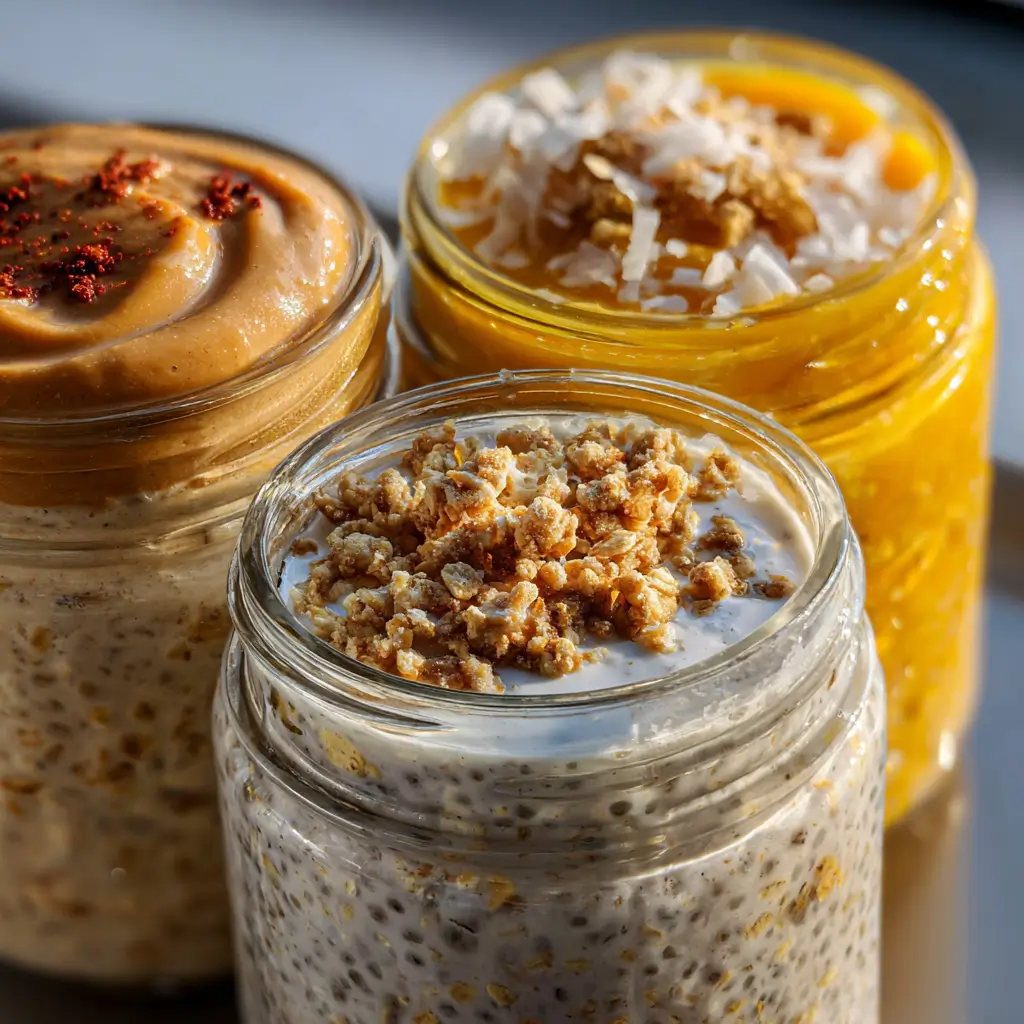
If you want to skip powders, try our vegan no powder overnight oats for naturally high-protein options using whole foods.
Healthy Fat Boosters
Another key factor when asking “are overnight oats good for you?” is whether they include healthy fats. Fats help your body absorb fat-soluble vitamins and keep you full longer. Popular healthy fat boosters include almond butter, chia seeds, flaxseeds, walnuts, and shredded coconut.
These additions make overnight oats more balanced and nutrient-dense. Remember, fat isn’t the enemy—it’s essential for long-term energy and overall wellness.
Flavor Variations with Fruit and Spices
Finally, flavor matters. If you want to eat overnight oats every day, they need to taste amazing. Adding fresh fruit like berries, bananas, or apples provides natural sweetness and vitamins, while spices like cinnamon, nutmeg, and vanilla extract elevate the flavor without extra sugar.
So the next time someone asks “are overnight oats healthy?” you’ll know the secret—it’s not just the oats, but how you build your jar. With the right mix-ins, overnight oats can be one of the most complete breakfasts out there.
Common Questions About Overnight Oats
Are Overnight Oats Gluten-Free?
People often ask, “are overnight oats healthy if I’m gluten-free?” The answer is yes—if you use certified gluten-free oats. While oats themselves are naturally gluten-free, they’re often processed in facilities that handle wheat. To be safe, look for oats specifically labeled gluten-free. That way, you can enjoy the health benefits of overnight oats without worry.
Can You Eat Them Hot or Cold?
Another frequent question is whether overnight oats must be eaten cold. The truth is, overnight oats are good for you whether you enjoy them chilled straight from the fridge or warmed up in the microwave. Heating them won’t destroy their nutrients, so it’s purely about preference.
If you’re curious about details, don’t miss our full guide on do you eat overnight oats cold or heat.
Do Overnight Oats Help with Weight Loss?
A big one: “are overnight oats healthy for weight loss?” Overnight oats can definitely support weight management, but it depends on how you make them. A 200-calorie jar with just oats and milk might leave you hungry later, while a balanced version with protein and healthy fats can keep you satisfied for hours.
So yes—overnight oats are good for you if your goal is weight control, as long as you’re mindful of portions and ingredients. Adding fiber-rich fruits, seeds, and protein sources makes them both filling and nutrient-dense.
Best Recipes & How to Make Overnight Oats
Classic Overnight Oats Recipe
If you’re new to overnight oats, start simple. A classic version uses ½ cup rolled oats, ¾ cup milk or a dairy-free alternative, and 1 tablespoon of chia seeds. Mix, refrigerate overnight, and top with fruit in the morning. It’s proof that overnight oats are healthy even in their most basic form.
High-Protein Overnight Oats Recipe
For those who wonder, “are overnight oats good for you if I need more protein?” the answer is yes—just add protein-rich ingredients. Stir in Greek yogurt, cottage cheese, or a scoop of protein powder. This not only boosts satiety but also helps with muscle recovery.
You can find inspiration in our how much protein is in overnight oats guide, which breaks down exactly how to level up your breakfast.
Dairy-Free & Vegan Overnight Oats Recipe
Are overnight oats healthy for those following plant-based or dairy-free diets? Absolutely. Swap regular milk for almond, oat, or soy milk, and use coconut yogurt or skip yogurt entirely. Add nut butter for creaminess, and top with fresh fruit for natural sweetness.
This shows that no matter your lifestyle, overnight oats are good for you when you make them your own. They’re endlessly adaptable—whether you’re focused on weight loss, gut health, or simply enjoying a nourishing breakfast.
FAQs About Overnight Oats
Are overnight oats actually healthy?
Yes, overnight oats are healthy when made with balanced ingredients. They provide fiber, complex carbs, and important minerals that support digestion and heart health. Add protein and healthy fats, and overnight oats become a complete, nourishing meal.
What happens if we eat overnight soaked oats daily?
Eating overnight oats every day can support digestive health, help regulate cholesterol, and provide steady energy. To maximize benefits, vary your toppings and include protein-rich add-ins to keep your meals balanced.
What is the nutritional value of overnight oats?
A standard serving of overnight oats contains about 200–250 calories, 8–12 grams of protein, 5–10 grams of fat, and 7–10 grams of fiber, depending on the recipe. These nutrients make them a nutrient-dense, filling breakfast option.
Why are overnight oats so high in calories?
Overnight oats can seem high in calories because of toppings like nut butter, seeds, yogurt, or dried fruit. But those calories are nutrient-rich, meaning they fuel your body with protein, fiber, and healthy fats—not empty calories.
Conclusion: Are Overnight Oats Healthy?
So, are overnight oats healthy? The answer is a clear yes. When prepared thoughtfully, overnight oats are more than just a trend—they’re a nutritious, versatile, and satisfying meal that fits into almost any diet. Whether you’re aiming for weight loss, better digestion, or simply a balanced breakfast, overnight oats can be customized to meet your goals.
At the end of the day, are overnight oats good for you? Absolutely. With endless variations and the ability to prep them in advance, they’re one of the simplest ways to enjoy a wholesome breakfast every day.
Don’t miss our overnight oats 101 guide to dive deeper into everything you need to know about this nutrient-packed meal.
(Psst — don’t forget to join our community on Facebook and follow us on Pinterest for fresh recipe ideas daily!)
